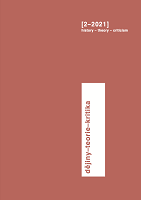Není stále jasné, co jsou to protisocialistické síly
It is still not clear what the anti-socialist forces are
Author(s): Petr AndreasSubject(s): Political history, Social history, Marxism, History of Communism, Rhetoric
Published by: Univerzita Karlova v Praze - Fakulta humanitních studií
Keywords: Communist Party of Czechoslovakia (KSČ); Prague Spring; Normalization; discourse; rhetorics; Marxism-Leninism; antisovietism; concept of enemy;
Summary/Abstract: In this study, the author focuses on the leadership of the Communist Party of Czechoslovakia (KSČ), its discourse on the enemy, and its rhetoric against it in 1967–1970. In terms of domestic and foreign policy relations, the Czechoslovak reform, and Prague Spring consisted in the fact that the First Secretary of the Communist Party of Czechoslovakia, Alexander Dubček, weakened and negated the rhetoric against the enemy and reduced the traditional conceptual apparatus to suppress the enemy, used by his predecessor, Antonín Novotný. This caused a disagreement with the allies. Their political and military pressure, including the intervention, was intended to encourage the Communist Party of Czechoslovakia to ‘see’ the enemy again and speak a common language about it. Under the pressure of ‘Normalization’, the Communist Party leadership gradually enlarged the circle of the party’s enemies (right-wing, Liberalism, and Conservatives) to include those unaccepted by the allies led by the Soviets (anti-socialist forces, anti-Sovietism), and conversely, it ceased to oppose those who were aligned with the Soviets (Conservatives). Conceptually, the domestic terminology concerning the enemy adapted to the Soviet terminology and eliminated the remains of the domestic political traditions. At the rhetorical level, the Czech Communist representatives remained firmly enclosed in a framework which I call the Marxist-Leninist conceptual-rhetorical model of thinking about the enemy, and with the attributes indicating the individual groups of enemies, they also adopted concepts such as anti-social forces, the vagueness of which enabled them to bridge the discrepancies between the domestic and Soviet concepts of the enemy. Anti-Sovietism became the key term which enabled the transfer of power in the Communist Party leadership in April 1969.
Journal: Dějiny - Teorie - Kritika
- Issue Year: 2021
- Issue No: 02
- Page Range: 183-224
- Page Count: 42
- Language: Czech

